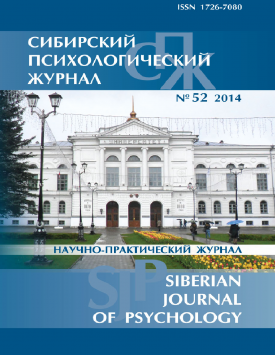The unity of emotional and intellectual - extra motivation for freedom of creativity
Freedom of creativity is based on the unity of functional-dynamic components of consciousness. From the viewpoint of reflexive-activity approach, developed by us based on subject-activity approach S.L. Rubinstein, it can be the subject of empirical research as awareness, experience and changing the boundaries of the virtual possibilities of the person in the course of the produced by him new, original image, discovery and embodiment of the activities of the unique knowledge, significant from the point of view of culture and its development. Its predictors are individual peculiarities of the personality, mental experience, intelligence, creativity, and other qualities of the mind (all together they constitute a resource of the subject). Freedom of creativity is ensured by increasing the motivation, the strengthening of which occurs at the expense of the unity of emotional and intellectual, development of self-efficacy, enrich the experience, enhance mental activity. When the senses and intellect are in unity, subject easier to overcome obstacles in the knowledge, creative activity. Emotions support the semantic field. Activity becomes significant, what is difficult becomes interesting. According to the theory of social learning of A. Bandura, additional motivation occurs in situations of social learning, of solving tasks given to a person with the ability to choose the level of their complexity and feedback, giving the opportunity to realize own success, self-efficacy and to exercise self-control. It is highly probable that a sense of self-efficacy is an additional motivation for creative activity, it becomes a resistant desire of a man to understand the complex task, to find the logic of the movement in its execution, to open the essence of the phenomenon, to realize itself as self-efficacy. Opening of the essential knowledge about the Being, experiencing the intoxication of the creative process, the person is abstracted from his Self for sometime and a sense of self-efficacy goes to the side. During the self-reflection about the products of creativity, understanding that they give to other people, a person might start having dignity that is the highest expression of self-efficacy, the pledge of the future creative aspirations. Self-efficacy is raised to the existential level of the relations of a man with the world, which is in line with other existentials (guilt, despair, anxiety...). A byproduct of joining in the feedback in the course of realizing the results of tasks or the ways how the poetic thought is flowing by the person might cause him to have a sense of self-efficacy, initiate additional motivation for creative activities, contributing to overcome obstacles in it.
Keywords
единство эмоционального и интеллектуального, побочный продукт, самоэффективность, свобода творчества, поэтическое творчество, unity of emotional and intellectual, a side product, self-efficacy, freedom of creativity, poetic creativityAuthors
| Name | Organization | |
| Kuzmina Elena I. | Military University of the Ministry of Defense of the Russian Federation (Moscow) | kuzminael1@yandex.ru |
References

The unity of emotional and intellectual - extra motivation for freedom of creativity | Sibirskiy Psikhologicheskiy Zhurnal – Siberian Journal of Psychology. 2014. № 52.
